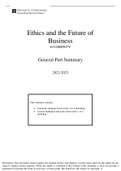Samenvatting
Ethics and the future of business (6314M0507Y) Complete Summary (grade 9.8)
- Vak
- Instelling
This detailed summary is prepared for the general part exam of the course Ethics and the future of business (6314M0507Y), which is a part of the MSc BA programme at the University of Amsterdam in the study year . The summary includes all the literature from weeks 1 to 4 and lecture notes from weeks...
[Meer zien]



